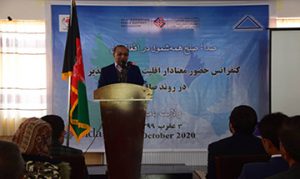Report from the Provincial Conference "Meaningful Presence of Vulnerable Minorities in the Peace Process”, Bamyan Province, October 24, 2020.

The conference was organized by the Civil Society and Human Rights Network(CSHRN), and Human Rights and Eradication of Organization(HREVO) with more than seventy participants comprising Sadat, Qizilbash, Shia Ismaili religious minorities, civil society activists, media and journalists, provincial officials including the Bamyan governor, Representative of the Provincial Council, Representative of the Police Department, Head of Ethnic and Tribal Border Office, Field Officer of the Afghanistan Human Rights Commission, University Professors, Students and Educators, and Mr. Abdul Wadood Pedram, Executive Director of HREVO, held at the Highland Hotel in Bamyan.
The conference began with a recitation of the Holy Quran by one of the participants and then Ismail Zaki, on behalf of CSHRN and HREVO, talked about the goals of the conference and the research conducted by both the organizations in nine provinces, and presented a research report to the audience.
Afterward, the Governor of Bamyan, Sayed Anwar “Rahmati”, discussed the issue and while appreciating the conference said that, “All Afghans want peace, and the government is using every opportunity to achieve it. The release of some of the most dangerous members of the Taliban indicates the goodwill of the Afghan government. But we will not neglect our two decades’ achievements and defend them with all our might”
Subsequently, Mr. Mohammad Sajjad Mohseni, the spokesman of the Bamyan Ulama Council, talked about tolerance from the Islamic point of view and said: ” Islam emphasizes tolerance and peaceful coexistence, and advises its followers to be tolerant and forgiving.”
Afterward, Mr. Haji Asadi, a representative of the Provincial Council, emphasized on maintaining unity and integrity among all segments of society and considered maintaining the republican system as one of the duties of all citizens. “We have no choice but to support this system and there is no other alternative”, said Mr. Asadi.
Following him, Mr. Mohammad Javad Dargar, Head of the Field Office of the Afghanistan Independent Human Rights Commission, discussed the fundamental rights of religious and ethnic minorities in international and national Laws, including civil, political, economic, social, and cultural rights. He said that the government is responsible for providing these rights to ethnic and religious minorities.”
In the second part of the conference, Ms. Masoma Amiri, a member of civil society and women’s rights activist, Mr. Reza Ebrahim, Vice-Chancellor of Students Affairs of Bamyan University, and Dr. Mahram Ali Nawrozi, Vice-Chancellor of Academic Affairs of Bamika University, were introduced as the members of the panel, chaired by Ismail Zaki.
Ms. Masoma Amiri highlighted the legal solutions for ethnic and religious minorities in the country’s laws, including the constitution, and said, “Fortunately, to some extent, the country’s constitution recognizes the rights of religious and ethnic minorities and religious freedoms enshrined in law for them reflect this fact. However, the law has its problems with minorities, including the condition that the president and his deputies who run for office must be Muslim, and this violates religious minorities’ rights”, said Ms. Amiri.
From a sociological point of view, Mr. Reza Ebrahim addressed the issue and noted that the ongoing peace negotiation has always neglected vulnerable minorities, and cherished political and ethnic elites. He added that to create a diverse nationwide discussion, and to be able to include the voices and demands of different segments of the people in the process, in addition to using international peace-building experiences, local solutions for including vulnerable groups in the process should be utilized.
The last speaker of the panel was Dr. Mahram Ali Nawrozi, who addressed the issue from a political perspective and summarized their discussion on the dynamism of power in Afghanistan, stating that three factors have been involved in the dynamism of power: 1. ethnicity 2. foreign support 3. religion.
Strategies discussed for involving minorities were as follows: 1. Decentralization of power 2. The secularization of the political system 3. Lobbying with foreign powers 4. Changing minority groups perspectives 5. Defining common interests among minorities.
The third part of the conference was attended by three representatives of ethnic minorities. Mr. Ahmad Zaki Mesbah from Sadat ethnic minority, Mohammad Amir Danishiar from Shia Ismaili religious minority and Mir Hussain Mohammadi from Qizilbash ethnic minority expressed their demands: Paying attention to minorities, involving them in national processes, and recognizing their religions. The conference ended with the reading a resolution by Ms. Soraya Haqyar, a member of Bamyan civil society.